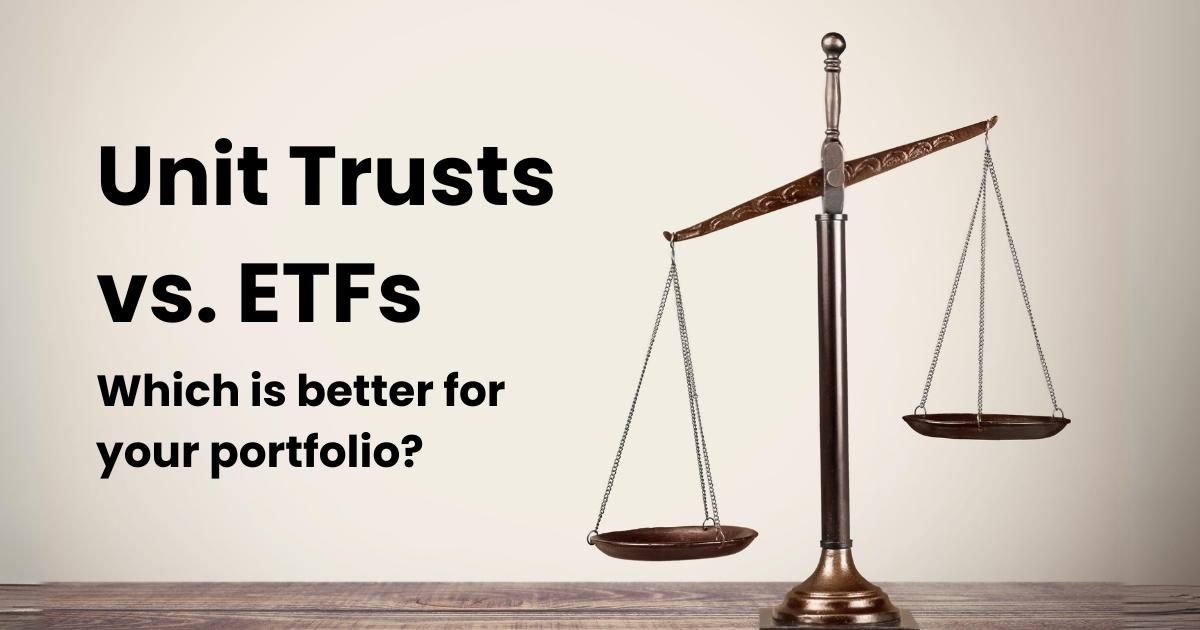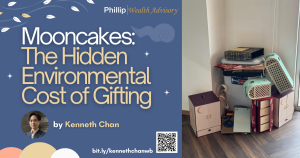Unit Trusts vs Exchange Traded Funds (ETFs) – Which is better for your portfolio? May 20, 2024

Imagine you are dining at a nice restaurant, feeling overwhelmed by the variety of seemingly delectable dishes. However, you have a limited budget and you can only afford to order one dish.
This situation is frustratingly similar to being new to investing and overwhelmed with the variety of investment options in the market. With a limited budget, you will need to carefully weigh the pros & cons of each investment product before you make your investment decision.

What are Unit Trusts and ETFs?
Unit trusts and ETFs are both funds. In simple terms, a fund is usually a basket of assets that offers diversification to investors.
Unit Trusts: Also known as mutual funds, Unit Trusts are a form of investment for which professional fund managers pool investors’ monies together to invest in a diversified portfolio of assets. A typical unit trust consists of bonds, stocks, and other types of securities.
Fund managers aggregate the value of all the different types of assets they invest in and generate a Net Asset Value (NAV). This NAV represents the value per unit of the fund, which is also the price at which it is traded. The performance of a unit trust generally depends on the fund manager’s ability to generate returns above a benchmark index.
Exchange-traded funds (ETFs) are open-ended investment funds listed and traded on a stock exchange. They aim to track or replicate the performance of an underlying index or asset. ETFs provide access to a wide variety of markets and asset classes.
The price of ETFs is determined by the value of their underlying asset and the market demand and supply of the ETF, while their performance depends on the respective index that the ETF tracks.
What are the differences between Unit Trusts and ETFs?

1. Passive vs. Active Management
Passive Management refers to an investment style whereby the objective is to track or “mirror” an established index like the Singapore Straits Times Index (STI) or the US S&P 500 Index. This is the opposite of Active Management, which involves active screening and selection of stocks, bonds, or other securities to meet an investment objective or outperform a benchmark.
Unit trusts are typically managed by experienced fund managers who use their expertise to make discretionary investment decisions, aiming to outperform the market or a specific benchmark. In contrast, ETFs are more commonly associated with a passive management style, primarily focusing on tracking indexes.
| Unit Trusts | ETFs |
| Typically employ active management strategies, with fund managers actively managing assets according to a specified investment strategy aimed at outperforming a benchmark | Usually adopt passive investment strategies, focusing on tracking or replicating indices |
Whether you should adopt a more active or passive approach depends on what you’re investing in and your knowledge about the markets. For example, given their smoother flow of capital, developed markets might be well-served by passively managed options. On the other hand, active management could give your portfolio an edge in emerging markets where efficiently picking stocks may have a more significant impact.
2. Exchange vs. Non-exchange Trading
Unit trusts are not traded on an exchange and are “forward priced.” Forward pricing is used to determine the price of a fund’s “units” based on the end of day net asset value (NAV) of the fund. Transactions typically use a single daily “dealing price”; and the transacted price or NAV is known about two business days after the purchase is made.
As the name suggests, ETFs are traded on a stock exchange which allows for real-time price dissemination and transactions. The price of an ETF is influenced by a combination of market demand and the performance of the underlying index that the ETF is tracking.
| Unit Trusts | ETFs |
| Not transacted via an exchange; buying and selling are usually based on a single daily “dealing price.” After transacting, the price/NAV is known roughly 2 business days later due to “forward pricing.” | Transacted on a stock exchange; buying and selling ETFs is similar to buying and selling stocks. |

3. Upfront Costs
These costs can add up, especially with smaller investment amounts. Since ETFs typically require the purchase of whole shares, frequent commission fees can chip away at your returns. In contrast, Unit trusts allow you to invest any amount, thereby minimising the impact of these fees.
| Unit Trusts | ETFs |
| When you invest online independently, you may transact with as little as zero sales charge. However, prior to investing on your own, you must pass our Customer Knowledge Assessment. | Investing in ETFs incurs a brokerage charge similar to trading stocks. Additionally, there may be a minimum brokerage fee per transaction, applicable to both buying and selling. |
4. Tax Considerations
| Unit Trusts | ETFs |
| When a unit trust fund receives dividends from its underlying investments, these are usually tax-exempt for investors. | ETFs listed outside of Singapore might incur a layer of tax complexity when dividends are issued. |
Conclusion
If you’re a new investor in Singapore with a smaller budget, unit trust funds might be your perfect gateway to the world of investments. Their flexibility in terms of investment amount, potentially simpler tax structure, and the option for active management in specific markets make them a compelling choice. Are you ready to explore the delicious world of unit trust funds and start building your financial future?
Contributor:

Winshern Ho
Wealth Manager
Phillip Securities Pte Ltd (A member of PhillipCapital)
https://bit.ly/TTPWinshernHo
Disclaimer
These commentaries are intended for general circulation. It does not have regard to the specific investment objectives, financial situation and particular needs of any person who may receive this document. Accordingly, no warranty whatsoever is given and no liability whatsoever is accepted for any loss arising whether directly or indirectly as a result of any person acting based on this information. Opinions expressed in these commentaries are subject to change without notice. Investments are subject to investment risks including the possible loss of the principal amount invested. The value of the units and the income from them may fall as well as rise. Past performance figures as well as any projection or forecast used in these commentaries are not necessarily indicative of future or likely performance. Phillip Securities Pte Ltd (PSPL), its directors, connected persons or employees may from time to time have an interest in the financial instruments mentioned in these commentaries. Investors may wish to seek advice from a financial adviser before investing. In the event that investors choose not to seek advice from a financial adviser, they should consider whether the investment is suitable for them.
The information contained in these commentaries has been obtained from public sources which PSPL has no reason to believe are unreliable and any analysis, forecasts, projections, expectations and opinions (collectively the “Research”) contained in these commentaries are based on such information and are expressions of belief only. PSPL has not verified this information and no representation or warranty, express or implied, is made that such information or Research is accurate, complete or verified or should be relied upon as such. Any such information or Research contained in these commentaries are subject to change, and PSPL shall not have any responsibility to maintain the information or Research made available or to supply any corrections, updates or releases in connection therewith. In no event will PSPL be liable for any special, indirect, incidental or consequential damages which may be incurred from the use of the information or Research made available, even if it has been advised of the possibility of such damages. The companies and their employees mentioned in these commentaries cannot be held liable for any errors, inaccuracies and/or omissions howsoever caused. Any opinion or advice herein is made on a general basis and is subject to change without notice. The information provided in these commentaries may contain optimistic statements regarding future events or future financial performance of countries, markets or companies. You must make your own financial assessment of the relevance, accuracy and adequacy of the information provided in these commentaries.
Views and any strategies described in these commentaries may not be suitable for all investors. Opinions expressed herein may differ from the opinions expressed by other units of PSPL or its connected persons and associates. Any reference to or discussion of investment products or commodities in these commentaries is purely for illustrative purposes only and must not be construed as a recommendation, an offer or solicitation for the subscription, purchase or sale of the investment products or commodities mentioned.
About the author
Winshern Ho
Wealth Manager
Winshern Ho is a wealth manager, investor, and enthusiastic traveller. His interest in the financial markets was ignited by the 2008 financial crisis. With his extensive experience, Winshern helps his clients navigate their financial paths effectively.
He relies on well-established strategies to develop clear, practical financial plans. These plans focus on achieving long-term goals rather than pursuing short-term gains.
Additionally, Winshern is the founder of a start-up. His goal is to inspire more people to take control of their finances, understand what drives their financial decisions, and equip them with the skills and knowledge they need for financial stability and happiness.

 Protecting More Than Just Walls: Fire Insurance vs Home Insurance
Protecting More Than Just Walls: Fire Insurance vs Home Insurance  Before the Year Ends: Key Financial Steps for a Confident 2026
Before the Year Ends: Key Financial Steps for a Confident 2026  The ILP Debate: Why Singaporeans Struggle With Financial Product Decisions
The ILP Debate: Why Singaporeans Struggle With Financial Product Decisions  Mooncakes: The Hidden Environmental Cost of Gifting
Mooncakes: The Hidden Environmental Cost of Gifting 





